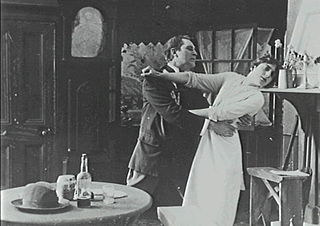Related Research Articles

Thunderbolt is a 1910 film in the genre of "outlaw" films at the time that tended to glorify the life of the outlaw "Bushrangers" that roamed the Australian outback in pre-commonwealth days. Shortly after this film was made, the government of New South Wales banned the manufacture of this type of film on the basis that they were promoting crime.

William Joseph Lincoln was an Australian playwright, theatre manager, film director and screenwriter in the silent era. He produced, directed and/or wrote 23 films between 1911 and 1916.
Get-Rich-Quick Wallingford is a 1916 Australian silent comedy film directed by Fred Niblo. The film was the first made by the film unit of theatrical firm J. C. Williamson, although it was one of the last to be released. It was Niblo's debut film as a director and is considered a lost film.
White Death is a 1936 Australian film directed by Edwin G. Bowen and starring Zane Grey as himself. He filmed it during a fishing expedition to Australia and it marked the first time he had played a leading role in a film.

The Streets of London is a 1934 Australian film directed by F. W. Thring. It was a filmed version of a play by Dion Boucicault which Thring had produced on stage the previous year. It was the last film made by Efftee Film Productions – Thring ceased production afterwards with the aim of resuming it later but died in 1936 before he had the chance.

Moonlite is a 1910 bushranger film about Captain Moonlite, played by John Gavin, who also directed. It was also known as Captain Moonlite and is considered a lost film.
The Birth of White Australia is a 1928 Australian silent film directed by Phil K. Walsh. It is an historical drama about the settlement of white Australia, including scenes of Captain Cook's landing at Botany Bay, skirmishes with Australian Aborigines and the Lambing Flat riots. This was Australia's last silent feature film, thanks to the advent of "talkies".
Rip Van Winkle is a 1912 Australian feature-length film directed by W. J. Lincoln about Rip Van Winkle. It was arguably Australia's first fantasy film.
The Remittance Man is an Australian melodrama film directed by W. J. Lincoln about a thief's reformation.

Transported is an Australian convict melodrama film directed by W. J. Lincoln.
The Road to Ruin is an Australian melodrama film directed by W. J. Lincoln. It was one of the first movies from Lincoln-Cass Films and is considered a lost film.

The Double Event is a 1911 Australian feature-length film directed by W. J. Lincoln based on the first novel by Nat Gould, which had been adapted several times for the stage, notably by Bland Holt.
Called Back is a 1911 Australian feature-length film directed by W. J. Lincoln based on a popular play which was adapted from an 1883 novel by Hugh Conway. Although the movie was a popular success it is now considered a lost film.
The Luck of Roaring Camp is a 1911 Australian feature-length film directed by W. J. Lincoln now considered a lost film. It was highly regarded in its day, in part because it was based on a play that was popular with audiences.
Odds On is a 1928 Australian silent film starring Arthur Tauchert set in the world of horse racing. It was the first film as director from noted cinematographer Arthur Higgins.

The Grey Glove is a 1928 Australian silent film based on a newspaper serial by E. V. Timms.
Environment is a 1927 Australian silent film about a woman who poses for a revealing painting. It was one of two films produced by Vaughan C. Marshall, the other one being Caught in the Net (1928).
Those Who Love is a 1926 silent film, produced in Australia, about the son of a knight who falls in love with a dancer. Only part of the film survives today and it is held by the National Film and Sound Archive.
The Cup Winner is a 1911 Australian silent film directed by Alfred Rolfe. It is set against a backdrop of horseracing and the finale involves real footage from the 1911 Melbourne Cup.
The Tenth Straw is a 1926 Australian silent film heavily inspired by the novel For the Term of His Natural Life. Little is known of the director and cast, but most of the film survives today.
References
- ↑ "THE HAYMARKET". The Sydney Morning Herald . National Library of Australia. 14 July 1928. p. 12. Retrieved 6 August 2012.
- 1 2 3 Andrew Pike and Ross Cooper, Australian Film 1900–1977: A Guide to Feature Film Production, Melbourne: Oxford University Press, 1998, 145.
- 1 2 "Australian Production Budget Drops Ninety Thousand Pounds This Year.", Everyones., 9 (459 (12 December 1928)), nla.obj-590190846, retrieved 7 March 2024– via Trove
- ↑ "THE GRAND THEATRE". The Advertiser . Adelaide: National Library of Australia. 30 October 1928. p. 21. Retrieved 6 August 2012.
- ↑ "THE PICTURES". The Argus . Melbourne: National Library of Australia. 8 May 1928. p. 7. Retrieved 6 February 2012.
- ↑ "MOVIES AND MUMMERS". The Sunday Times . Perth: National Library of Australia. 10 July 1927. p. 15. Retrieved 5 August 2012.